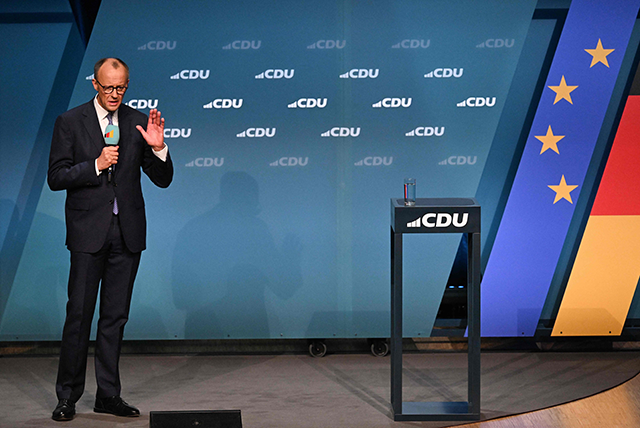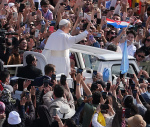You are here
Germany may face long wait for new government after vote
By AFP - Feb 20,2025 - Last updated at Feb 20,2025

Friedrich Merz, the leader of conservative Christian Democratic Union (CDU) and candidate for Chancellor, speaks at an election campaign event on Thursday in Darmstadt, western Germany (AFP photo)
BERLIN — German voters head to the polls in a winter election on Sunday but may not have a new government until the spring.
The confident frontrunner Friedrich Merz has said he's aiming for an Easter deadline and urged potential allies to get ready for speedy talks.
But arduous coalition negotiations tend to drag on for weeks if not months in Germany, spelling long stretches of political paralysis before a new chancellor takes charge.
"If we spend weeks, possibly months, possibly with party conferences and even member surveys then the period in which this country is without a majority capable of governing will be too long for me," he said in a Politico interview this week. In Berlin, a bulging in-tray of challenges awaits whoever is the next leader, from a stagnating economy to the Ukraine war and an increasingly hostile Trump administration.
Current polls give the conservative CDU-CSU alliance of Merz a strong lead over Chancellor Olaf Scholz's Social Democrats (SPD).
But the surveys also suggest that Merz's Party, now polling around 30 per cent, would need a junior coalition partner to gain a parliamentary majority.
Merz could potentially opt to work with Scholz's centre-left SPD in a so-called "grand coalition" of the two big-tent parties, known as the "GroKo" in German.
Scholz — whose own motley alliance with the Greens and the liberal Free Democrats (FDP) broke up in November — would not be expected to personally join such a government. Alternatively, a victorious Merz could invite the Greens into an alliance, but this so far has been strongly opposed by the CDU's Bavarian sister party the CSU.
Marathon talks
Attempting to forge any such pact forces former campaign trail foes to quickly make nice. The parties first engage in exploratory talks before moving on to full coalition negotiations. Scholz in 2021 needed 10 weeks from polling day to form his government with the Greens and the FDP.
Tired-looking selfies posted by party leaders during the marathon talks attested to the arduous work to forge a coalition of unprecedented complexity.
But the time span was "within the usual range", said Uwe Jun, political science professor at Trier University.
Coalition agreements are highly detailed and have a "contractual character", said Dorothee de Neve, politics professor at Justus Liebig University, but have long been a "feature of German politics".
The longest wait came in 2017, when it took Angela Merkel's conservatives some six months to forge a GroKo with the SPD.
Merkel's initial attempt at a coalition with the Greens and FDP spectacularly failed, prolonging the wait.
'Divided society'
Once staid German politics have been disrupted by the over decade-long rise of the far-right Alternative for Germany (AfD) Party, now polling around 20 per cent.
Although all other parties have vowed not to govern with the anti-immigration AfD, its popularity has eroded their voter support. A wild card in the election is whether a number of smaller parties will cross the 5-per cent threshold to enter parliament or be cast into oblivion.
The FDP and the upstart far-left BSW are fighting for their lives around the five percent death zone, while the other small leftist party Die Linke has polled somewhat higher in recent days.
Jun said that forming another grand coalition would "not be simple", given their "clear differences" especially on social and economic policy.
Nonetheless, the two mainstream parties have ruled together in three of the last five governments — a trend decried by the AfD, which labels them the establishment or "system parties".
When the ballots are counted, "fragmentation could produce a historically fractured parliament", said Michael Broening of the Friedrich Ebert Foundation.
"Regardless of the parliamentary makeup, social fragmentation is likely to persist," he told AFP.
"This will make coalition-building more challenging — not only within parliament but also in terms of broader engagement with an increasingly divided society."
Related Articles
BERLIN — Germans began voting Sunday in a pivotal election, with the conservatives the strong favourites after a campaign rocked by a far-ri
BERLIN — Germany's conservative CDU/CSU alliance led by Friedrich Merz won Sunday's elections with between 28.5 and 29 percent of the vote,
Berlin — Germany's centre-left Chancellor Olaf Scholz lost a confidence vote on Monday after weeks of turmoil, setting Europe's b















